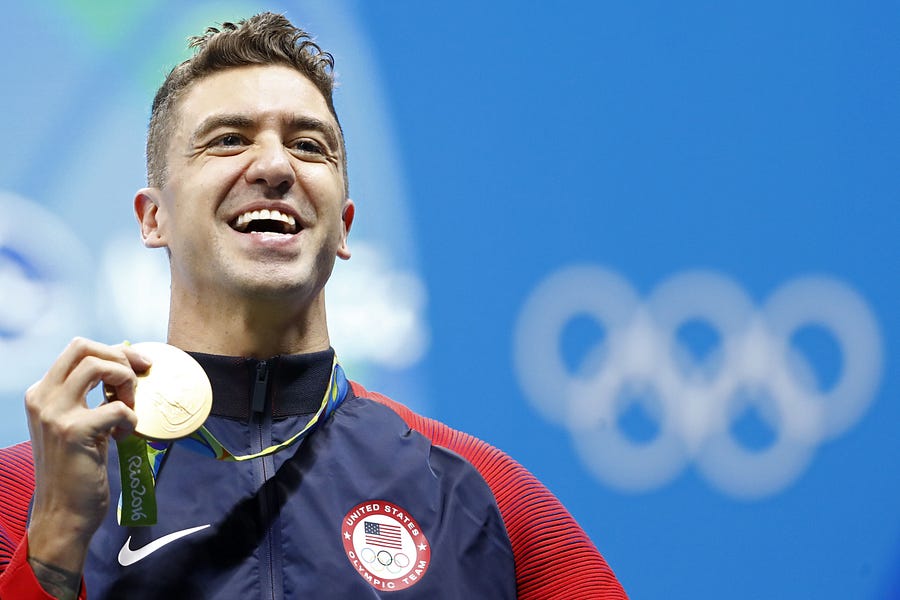In a perfect world, Anthony Ervin would be in Tokyo this week with Team USA, attempting to win his fifth Olympic swimming medal. Instead, he is in Canada with his young family, with lots of “Sesame Street, kids books, [and] drives to provincial parks to hike amidst the mosquitoes.” And, something that many athletes whose seasons have been put on hold can relate to, “I haven’t even smelled a chlorinated coordinated pool in over 100 days.”
Millions of Americans have missed precious milestones or had major life plans disrupted by the pandemic. But Ervin’s situation is, while not unique, still unusual. On his best days, he’s been able to swim faster than anyone in the world. But, at age 39, those “best days” are numbered. And on March 24, the IOC announced that the 2020 Tokyo Games, originally scheduled to start on July 24, would be postponed for a year. Ervin already set a record at the 2016 Rio Games for being the oldest individual gold medalist at age 35. Even competing at age 39 was a daunting enough task. Now he’d have to try when he’s 40. He was, understandably, angry. But he’s not ready to be done.
The postponement of the Olympic Games has affected all athletes who were training to peak at just the right time this summer. But the effect is magnified with Ervin. Now he has to wait another year, see his body age even more, and try to avoid injury at an age which every American swimmer in Olympic history but one has retired by—Dara Torres, who was 41 when she swam in the 2008 Olympics, being the sole exception. Ervin, who’s won three golds and a silver in previous Olympics, says he’s more than aware of the “cost of brittleness and easy injury” that come with age, and to make up for his lost youth he’s now more focused on training smartly. “I’m more master and designer of what I do than as a youth,” said Ervin. “With age comes better vision and strategy.”
Meanwhile, Ervin hasn’t had access to a pool in months, and with gyms being closed it’s been hard to get any dry land training in. “My training today specifically is egregiously impacted by Covid,” said Ervin. “I run 10k, do push-ups, sit-ups, and other plyometric/movement training.”
Qualifying for the Olympics next year will be more difficult than it’s ever been for Ervin, but he’s no stranger to defying the odds. As a teenager he was diagnosed with Tourette syndrome, which caused tics like uncontrollable blinking, not exactly something you want to occur during competitive swimming. With the help of medication, he was able to overcome the disorder, and went on to win his first gold medal in the 50 meter freestyle at the 2000 Olympics, at age 19.
Then he started using drugs, stopped practicing, and three years later officially retired from swimming. In 2008, he decided to turn his life around and began training again. He qualified for the Games in 2012 and took fifth place in the 50 meter free. And then, a full 16 years after winning the event for the first time, he won the 50 at the 2016 Games in Rio.
Going into the 2016 games, the record for oldest swimmer to win gold in an individual event was held by Duke Kahanamoku, who, at the age of 30, won the 100 meter freestyle at the 1920 Olympics. The Rio Games, at least in terms of swimming, were billed largely as a farewell tour for Michael Phelps, who eclipsed Kahanamoku by winning the 200 butterfly and 200 individual medley at age 31. And then three days later, Ervin came along and won the 50 free at age 35.
During his coronavirus-enforced break, much of Ervin’s energy has been focused on projects other than training. One particularly relevant during our current political moment: “correcting the racial disparity in swimming and the downstream effects that has on society.” Ervin is of Ashkenazi Jewish descent on his mother’s side and African American descent on his father’s. He was just the second swimmer of African descent to win an Olympic medal and the first American swimmer of African descent to do so when he won his first gold medal at the 2000 Olympic Games.
“The goal [of the project] is running interventions on where existing organizations can serve more black and brown children in learning to swim,” said Ervin.
Club swimming is more expensive than many youth sports, between having paid professional coaches, facility rentals, competition fees, and travel expenses. Ervin’s hoping to develop partnerships with groups and institutions across America to increase community involvement in the project and help alleviate the price barriers that prevent so many from being able to participate in the sport.
Ervin has also involved himself in the social justice movement sweeping the country. “Police brutality is a real problem,” he said. “And it affects black folk differently than the rest of Americans; nonetheless it’s a problem for all Americans. Just my opinion, but I think the concept of policing needs rewriting; more training, more social workers with badges, a dilution of the use of submissions and weapons, less visible weapons all together.”
He’s working alongside other athletes to challenge the International Olympic Committee’s Rule 40, which prevents athletes from making money off of their likenesses while the Games are occurring, and Rule 50, which forbids protests and demonstrations during the Games. Ervin explained his support for striking down Rule 50 in an interview with Swimming World: “I’ve stood on the podium singing the Star-Spangled Banner as loud as I could. And I don’t sing very well, so it was probably a little off-key, to the cringing of maybe some ears nearby. But I was proud, and that was in my heart. Who knows what’s going to be in somebody’s heart? I don’t get to tell anybody what’s in their heart in that moment, when they get to reflect on how they got there and the country they come from. I feel like Rule 50 is a repudiation of that, a denial of what’s in your heart.”
When I asked Ervin if he would engage in any form of protest if he made it to Tokyo next year, he responded: “The genuine authentic answer is: I don’t know. So much can change in a year. My hope is that Rule 50 will be reforming, and America will reunite and be ready to become better than ever before.”
With the Olympics now a whole year away, Ervin will be visiting his parents in the States for a while, and he’s not sure when he’ll start training in earnest again. “My life is a wilderness,” Ervin said. “Training for success, how I’m used to conceiving it, is a laboratory.” But he will start training again. And when the Olympic trials in Omaha start on June 13 next year, he will be there. And then, when the Games begin in Tokyo next summer he might just be there, too. It’s hard to think of another 40 year old who would stand a better chance.
Photograph of Anthony Ervin by Odd Andersen/AFP/Getty Images.







Please note that we at The Dispatch hold ourselves, our work, and our commenters to a higher standard than other places on the internet. We welcome comments that foster genuine debate or discussion—including comments critical of us or our work—but responses that include ad hominem attacks on fellow Dispatch members or are intended to stoke fear and anger may be moderated.
With your membership, you only have the ability to comment on The Morning Dispatch articles. Consider upgrading to join the conversation everywhere.